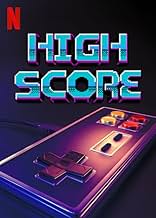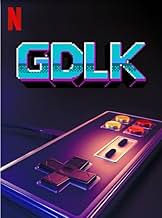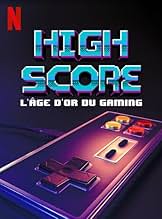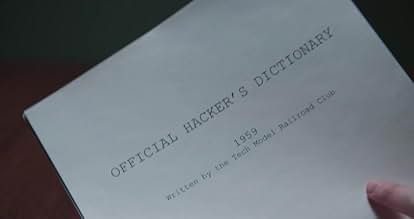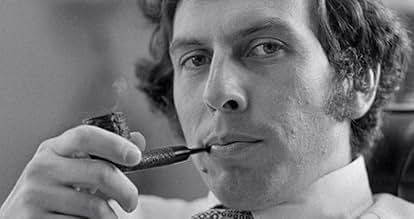PUNTUACIÓN EN IMDb
7,4/10
9,2 mil
TU PUNTUACIÓN
Gracias a su ingenio y gran determinación, pioneros en computación y artistas visionarios de todo el mundo crearon los icónicos mundos de "Space Invaders" o "Final Fantasy", entre muchos otr... Leer todoGracias a su ingenio y gran determinación, pioneros en computación y artistas visionarios de todo el mundo crearon los icónicos mundos de "Space Invaders" o "Final Fantasy", entre muchos otros.Gracias a su ingenio y gran determinación, pioneros en computación y artistas visionarios de todo el mundo crearon los icónicos mundos de "Space Invaders" o "Final Fantasy", entre muchos otros.
- Premios
- 2 nominaciones en total
Explorar episodios
Reseñas destacadas
The documentary has its strengths with showing the people that actually made the game and give some background to the games we loved to play as kids.
The bit annoying part is that the documentary is trying too hard to be inclusive on diversity, including people on project just for the purpose of diversity, not for technological or creative break-throughs.
Annoying too is that they half-jokingly make E.T. responsible for bringing down the video console industry in 1983. My personal bet is that Commodore 64 and sharing games on floppy had a huge influence on that.
There are some fantastic interviews and enactments with actually legendary people like Richard Garriott and Roberta Hall among others, whose influence have shaped a whole industry to this day which impacted billions of lives. Then it moves onto some nobody who did something nobody cared about who talks about how he was oppressed by some long gone bigots. Seriously, it's mind boggling how they cannot just keep talking about games and creators without inserting totally irrelevant stuff. It's a massive disservice to many people who literally ceated history and I get why many didn't take the time to talk as it dilutes the experience. Just cut some 10-15 minutes each episode and there is a decent enough, even if lacking documentary.
Enjoyable series, though totally absent is Amstrad, Spectrum and Commodore for some reason and they played a major role in games long before Nintendo and Sega.
I'll get the obvious out of the way right up top here: calling "High Score" a "history of video games" is a massive blunder. In no way, shape, or form does this doc attempt any sort of comprehensive look at the game industry. That being said, the simple access to key figures of that very industry makes this an interesting watch for gaming fans/historians.
Somewhat ironically, the biggest hallmark of "High Score" is also, in part, its biggest weakness. It gets access to some of the key figures to ever shape the gaming industry, whether that be Nolan Bushnell (early history), Tom Kalinske (Sega), John Romero (Doom), or Ken & Roberta Williams (adventure gaming). Those names were all enormous movers-and-shakers in the business, and provide first-hand accounts of the behind-the-scenes action.
The problem, however, is that "High Score" takes that access and tries to shape the video game narrative around it. In short, the doc makes the case that this is all the history one needs to know, which is a bit ludicrous. It would have been much better to structure/promote this doc as a series of interviews with industry luminaries and leave it at that.
Each episode here also features an aspect of competitive gaming, which often comes off as a bit odd. Not bad or boring, per se, but just a little strange as to why that angle was pursued so hard in the face of other much more interesting conversations to be had.
Overall, I enjoyed "High Score" just enough to keep watching--no more, no less. Had it been structured differently, it could have been a lot better. But even as-is, the one-on-one interviews with such high-profile figures give it a certain amount of cache.
Somewhat ironically, the biggest hallmark of "High Score" is also, in part, its biggest weakness. It gets access to some of the key figures to ever shape the gaming industry, whether that be Nolan Bushnell (early history), Tom Kalinske (Sega), John Romero (Doom), or Ken & Roberta Williams (adventure gaming). Those names were all enormous movers-and-shakers in the business, and provide first-hand accounts of the behind-the-scenes action.
The problem, however, is that "High Score" takes that access and tries to shape the video game narrative around it. In short, the doc makes the case that this is all the history one needs to know, which is a bit ludicrous. It would have been much better to structure/promote this doc as a series of interviews with industry luminaries and leave it at that.
Each episode here also features an aspect of competitive gaming, which often comes off as a bit odd. Not bad or boring, per se, but just a little strange as to why that angle was pursued so hard in the face of other much more interesting conversations to be had.
Overall, I enjoyed "High Score" just enough to keep watching--no more, no less. Had it been structured differently, it could have been a lot better. But even as-is, the one-on-one interviews with such high-profile figures give it a certain amount of cache.
I am enjoying this documentary. But Netflix and the writers are misrepresenting history in order to shoehorn racial diversity into the documentary.
The section I take issue with is with Jerry Lawson, a black man who is stated to be the "inventor" of the game cartridge. The documentary states that before Lawson became involved, it had "never been done before."
This is just flat out wrong. The swappable ROM cartridge concept was invented by Wallace Kirschner and Lawrence Haskel. Lawson worked on the Channel F game console, the first of its type, but swappable game cartridges had already been invented before he came along. So while it's certain he played a role in the development of an actual marketable, sellable product that used cartridges, it was not his invention, and unfair to the actual inventors to deprive them of their credit.
While I have no problem with Netflix very obviously choosing diverse individuals (transgender, black etc) to fit their well-known diversity mandates, it is NOT cool to twist the facts just to make the narrative work.
¿Sabías que...?
- CuriosidadesThe series is narrated by Charles Martinet, who is the voice actor for Mario.
- ConexionesReferenced in Film Junk Podcast: Episode 764: Bacurau (2020)
Selecciones populares
Inicia sesión para calificar y añadir a tu lista para recibir recomendaciones personalizadas
- How many seasons does High Score have?Con tecnología de Alexa
Detalles
- Duración
- 45min
- Color
Contribuir a esta página
Sugerir un cambio o añadir el contenido que falta




